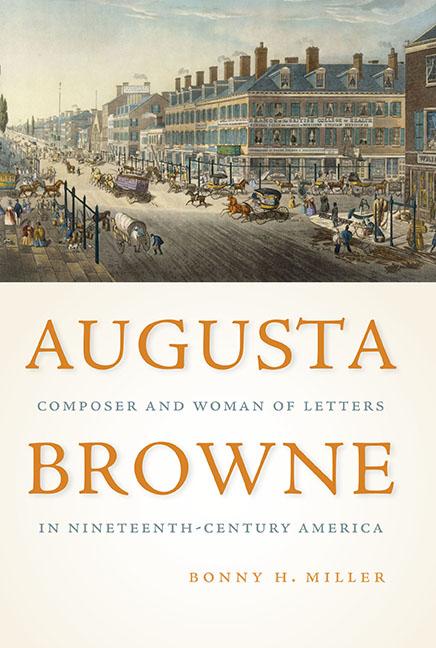Book contents
- Frontmatter
- Contents
- List of Illustrations
- Preface
- Acknowledgments
- Introduction
- 1 First Steps
- 2 Apprentice in a Family Music Business
- 3 Philadelphia Debut
- 4 A Young Professor of Music
- 5 A New Leaf
- 6 Her Own Woman
- 7 Courtship and Consequences
- 8 Pilgrim in Progress
- 9 “Glad Fruition”
- 10 Legacy in Music
- 11 Legacy in Literature
- 12 Contributions to Music Journalism
- 13 A Legacy Written into History
- Appendixes
- Appendixe 1 Children and Descendants of David Samuel Browne and Elizabeth Montgomery Browne
- Appendixe 2 Chronology of Augusta Browne’s Music and Letters
- Appendixe 3 List of Musical Works
- Appendix 4 Selected Glossary
- List of Abbreviations
- Notes
- Selected Bibliography
- Index
- Frontmatter
- Contents
- List of Illustrations
- Preface
- Acknowledgments
- Introduction
- 1 First Steps
- 2 Apprentice in a Family Music Business
- 3 Philadelphia Debut
- 4 A Young Professor of Music
- 5 A New Leaf
- 6 Her Own Woman
- 7 Courtship and Consequences
- 8 Pilgrim in Progress
- 9 “Glad Fruition”
- 10 Legacy in Music
- 11 Legacy in Literature
- 12 Contributions to Music Journalism
- 13 A Legacy Written into History
- Appendixes
- Appendixe 1 Children and Descendants of David Samuel Browne and Elizabeth Montgomery Browne
- Appendixe 2 Chronology of Augusta Browne’s Music and Letters
- Appendixe 3 List of Musical Works
- Appendix 4 Selected Glossary
- List of Abbreviations
- Notes
- Selected Bibliography
- Index
Summary
“Music, divine music, celestial visitant, what were life without thee?” With this invocation, Augusta Browne made a formal literary debut under her full name in the Columbian Magazine in January 1845. The opening words codified her ardent belief in the uplifting power of music and her faith in its heavenly origin. Every opinion that she voiced in this essay would return many times in her later prose: the presence of music in Scripture; the power of sacred music and oratorio; the potency of congregational singing; the empowering vigor of national airs; the connection between music and memory; and the degrading lyrics of songs performed in minstrel shows.
The composer had already made a minor journalistic debut in the New York press. A tribute in the Christian Intelligencer signed “A.B.” gave an account of her departed sister's embrace of faith in the certainty of death. Augusta's fourteen-year-old sister Elizabeth Browne had succumbed to an unidentified infection—the symptoms suggest encephalitis—during the family's first autumn in New York City in 1841. The obituary essay borrowed timeworn phrases of confidence in resurrection from psalms and hymns, but Augusta found her own poetic voice to proclaim, “The bright morning star, harbinger of approaching day, was shining above her inanimate clay, but upon her astonished soul was bursting the morning of a glorious eternity.”
Evident from these earliest articles is the prominence of Christian faith in her prose. Protestant faith and its practice were pillars of her worldview, as they were for many antebellum Americans. Augusta lived amid the nineteenth-century wave of Protestant spiritual renewal known as the Second Great Awakening, or the Great Revival, a movement that swept through America during the first half of the nineteenth century following the eighteenth-century First Great Awakening. The process of conversion and spiritual rebirth constituted the heart of this movement, also described as “revivalist Protestantism.” The older Calvinist tradition threatened hellfire and damnation, but the Great Revival movement invited sinners to repent and embrace the promise of salvation. The Puritan God of Wrath was supplanted by a loving Jesus in nineteenth-century denominations.
- Type
- Chapter
- Information
- Augusta BrowneComposer and Woman of Letters in Nineteenth-Century America, pp. 104 - 115Publisher: Boydell & BrewerPrint publication year: 2020

